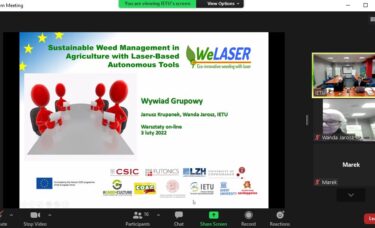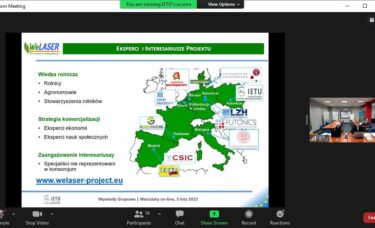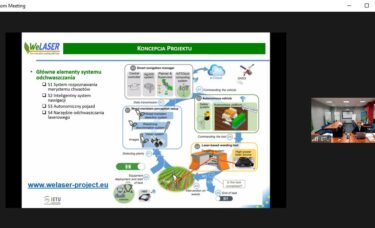
#WeLASER – Focus Group Interviews
Farmers, agricultural advisors, representatives of agricultural associations and scientists discussed the advantages and disadvantages of laser weed removal, as well as the opportunities and barriers to implementing innovative precision farming technologies, at a workshop organized as part of the WeLASER project.
During the workshop of the project WeLASER - Sustainable weed control in agriculture using autonomous tools using a laser on February 3 this year there was a discussion in the focus group and a SWOT analysis (Strengths, Weaknesses, Opportunities, Threats) was carried out. It allowed IETU scientists to gather information and opinions on the opportunities and barriers related to the implementation of precision farming techniques for weed control.
Based on the knowledge and experience of farmers' representatives, agricultural advisors, representatives of agricultural associations and scientists, we have obtained a lot of valuable information - says Dr. Janusz Krupanek, IETU who Leads the Polish group of the WeLASSER team of scientists. - They confirm how great a challenge for modern crop cultivation and plant protection is the need for a non-chemical method of reducing weed infestation in organic and integrated crops.
In addition to increasing social awareness of the impact of herbicides on the environment, the discovery of weed resistance to herbicides and the need to lower plant protection costs are becoming factors that force the reduction of herbicide use.
The topics covered in the discussion include the problem of non-chemical weed control, and the development of precise mechanical weed control. Will WeLASER be a panacea for manual weeding, which is labor-intensive, expensive and difficult to organize, especially in slow-growing crops with little competition for weeds? Will it reduce the use of herbicides?
The European Union "From Farm to Fork" Strategy assumes that by 2030 25% of agricultural land in the EU should be managed in accordance with the principles of organic farming. In integrated crop cultivation, it is recommended to use non-chemical methods of weed protection in the first place
In the cultivation of plants in accordance with the organic farming principles, direct treatments are important in the protection against weeds - mechanical weeding, carried out with the use of harrows, hillers, weeders - says Wanda Jarosz, IETU. - The technology of removing weeds with a laser can therefore be very useful.
The WeLASER device consists of an intelligent weed control system using artificial intelligence and elements coordinating the operation of the weed detection system, laser and autonomous vehicle.
We would like to thank all workshop participants for their cooperation!
Prep. W. Jarosz












